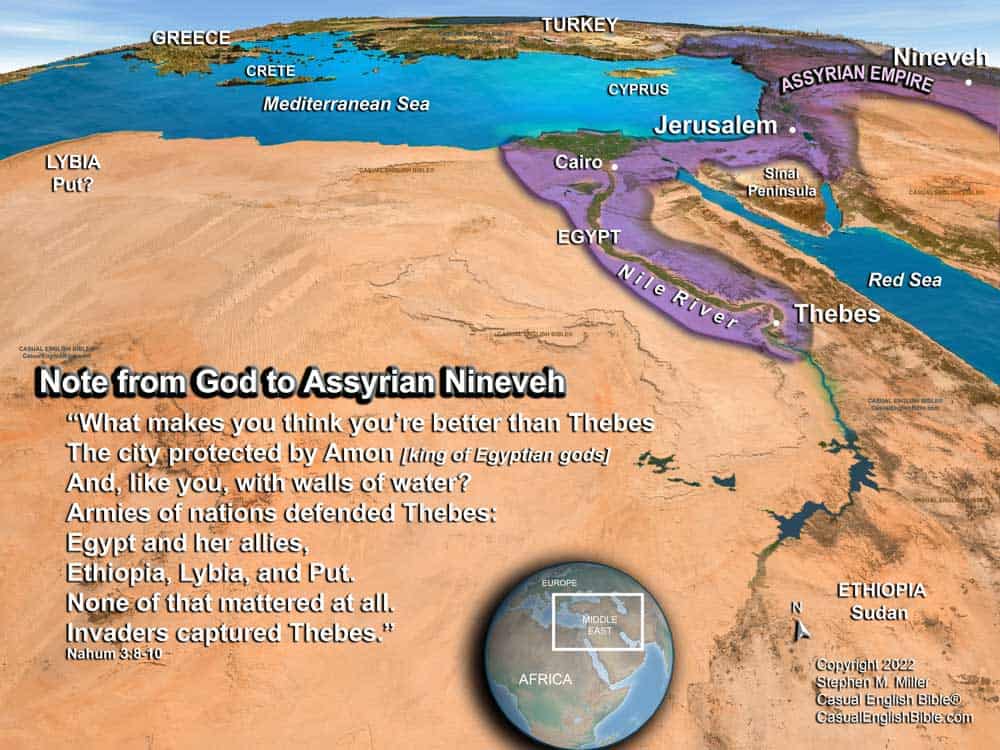Nahum 3
Nineveh done, dead, and gone
City where sin never sleeps
1Oh yes, sin city, where crime calls home.You’re a treacherous town,
Throbbing in violence.
You’re the city where sin never sleeps.
Nineveh’s fate
2Listen to the sounds of Nineveh to come:There’s a crack of the whip.
Thumping wheels.
Galloping horses.
Thundering chariots.
3Here comes the cavalry, but not to the rescue
Swords flash in the light.
Spears glisten in the sun.
While dead upon dead
Pile high and higher,
And survivors can’t walk
Without stepping on a corpse.
The perfect sinner
4The LORD of all people has a message for Nineveh:You committed the sins of a perfect sinner.
And you lured nations into your sins
With the unrestrained spirit of a witch.
5I’m going to deal with you now,
Says the LORD of all people.
I’ll lift up your dress, over your head.
I’ll show the world the naked you,
And the shame of what you’ve become.
6With the whole world watching,
I’ll pelt you with trash [1]
And treat you like trash,
To show how disgusted I am.
Nations will abandon you
7When people see what I do to you, they’ll say,“Nineveh’s dead, and good riddance.”
Who will help you then?
8What makes you think you’re better than Thebes, [2]
The city protected by Amon, [3]
And, like you, with walls of water?
9Armies of nations defended Thebes:
Egypt and her allies,
Ethiopia, [4] Lybia, and Put. [5]
10None of that mattered at all.
Invaders captured Thebes, [6]
Smashed babies in the rocks,
And arrested survivors for exile.
Invaders threw dice [7] for the nobles.
Top officials left home in chains.
11You in Nineveh get a dose of that, too.
The enemy will shock you
And you’ll stagger like drunks.
Then you’ll run for your lives and hide.
Your soldiers are girls
12Defensive towers you built on your wallsAre fig trees loaded with fruit.
Whoever shakes them
Will eat all they want.
13Your soldiers are girls.
Your gates are wide open,
And you couldn't lock them if you tried.
For their timber bars are firewood.
14Load up on water for a long siege.
Reinforce your walls.
Work the clay and mortar,
Then mold extra bricks.
15You’ll burn inside those walls.
Swords will drop you and kill you.
They’ll feed on you like locusts in a field.
Go ahead and grow your numbers.
Build yourselves into a swarm.
16You’re well on the way with your traveling merchants.
You’ve got more traders than the sky has stars.
But traders feed on you like locusts, too.
They eat, shed their skin, then fly away full.
Leaders are locusts, cold on a fence
17Your officials are more of the same.They’re a swarm of locusts doing nothing
But sitting on a fence in the cold.
When the sun comes up and turns on the heat,
They fly away to who knows where.
18Shepherds who led your nation are sleeping.
Great King of Assyria, they’ll never wake up.
What’s left of your people now hide in the hills.
There are no shepherds left to lead them.
19You, Great King, are wounded and dying.
Nothing will save you now.
When people hear you’re dead and gone,
They’ll clap and cheer and throw a party.
For at one time or another you’ve hurt them all.
And they’re happy to see you go.
Footnotes
The “pelt you with trash” expresses the Hebrew word for trash: šiqqûṣ. Most Bibles translate it as filth, which in our culture might hint of excrement. That could fall under the definition, but the imagery is broader than that. This prophet may be talking about the people of Nineveh, but to Jewish readers, “trash” might be anything a person in ancient times would consider: vile, detestable, or forbidden. For Israelites in those times, possible projectiles might include objects comparable to: pork chops (forbidden under Jewish law), idols, clothing of a corpse, roadkill, or menstrual cloth. An observant Jew who touched any of these would have to go through cleaning rituals and a waiting period before stepping foot on the Jerusalem Temple grounds.
Thebes was a large Egyptian city about 500 miles (800 km) south of the Mediterranean Sea. It was built along the eastern banks of the Nile River. The ruins are in what is now the city of Luxor. Centuries before Nahum, Thebes was capital of Egypt.
Amon—also spelled as Amun, Amen, Ammon. He was considered the king of Egyptian gods, and patron god of Thebes. One of the largest religious buildings in the ancient world was the Temple of Amon, the biggest part of the massive religious center of Karnak, in Thebes. It covered about 250 acres (100 hectares), which was larger than many ancient cities. It’s footprint on Egypt was about as large as 200 football fields, which is about a third of the size of the City of London.
Literally “Cush,” also known as Nubia and Ethiopia. This was a region along the Nile River south of Egypt, in what is now Sudan.
Some scholars say Put was another name for Libya or it may have been part of that nation. Others say it more likely refers to a place ancient Egyptian records call the Land of Punt, possibly in what is now Somalia. There are other educated guesses as well.
Assyrian king Ashurbanipal captured Thebes in 663 BC.
A more literal translation would be they “threw lots.” This may have been something as simple as stones with marks on them. Egyptians apparently played with cube-shaped dice. Archaeologists have found some in Egyptian tombs dating to about 2000 BC, long before the days of Nahum.
Discussion Questions
- Sorry, there are currently no questions for this chapter.










